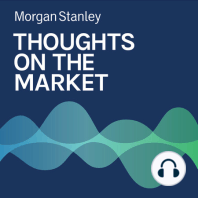3 min listen

Mid-Year Strategy Outlook: Risk/Reward in Currency and Commodities
Mid-Year Strategy Outlook: Risk/Reward in Currency and Commodities
ratings:
Length:
10 minutes
Released:
Jun 9, 2023
Format:
Podcast episode
Description
While the forecast for global bonds remains strong for the latter half of 2023, other asset classes could see bifurcated results across regions.----- Transcript -----Seth Carpenter: Welcome to Thoughts on the Market. I'm Seth Carpenter, Morgan Stanley's Global Chief Economist. Andrew Sheets: And I'm Andrew Sheets, Morgan Stanley's Chief Cross-Asset Strategist. Seth Carpenter: And on part two of the special two-part episodes of the podcast, we're going to focus on Morgan Stanley's year ahead strategy Outlook. It's Friday, June 9th at 10 a.m. in New York. Andrew Sheets: And 3 p.m. in London. Seth Carpenter: All right, Andrew, in the first part of this two part special, you were grilling me on the economic outlook. You were taking me to task on all of our views, pointing out the different ways in which our clients, investors around the world were pushing back at different parts of our story. And now, it's payback time. Let me ask you, basically, what are we thinking as a research house in terms of where the best trades are likely to be for markets? We're looking for a soft landing in the U.S., but that doesn't mean a good outcome. So very weak economic activity and policy rates that are still restrictive. So what is that type of backdrop going to mean for one of the most closely watched assets in the world, the U.S. dollar? Andrew Sheets: Sure. So we do think that this backdrop, despite the fact that on the surface it looks decent, you have the U.S. and Europe avoiding recession. You have stronger growth in Asia, but you have a lot of uncertainties that are front loaded, and you still have slowing growth, you still have tight monetary policy. And we think this is going to still lead to a somewhat more difficult backdrop for markets over the next three months. And so I think in that context, the U.S. dollar looks quite attractive. The US dollar pays investors to hold it, it's a so-called positive carry currency against most major currencies and it's a diversifying currency, so as an asset it helps protect your portfolio. And I also think kind of within this context, if any economy is going to be able to handle higher interest rates, well, it might be the U.S. where a large share of consumer debt is fixed in a long term mortgage, which is very different from what we see in Australia or the UK or Sweden. So, we think that the dollar will do better, we think the dollar will do better in large part because of this attractiveness in a portfolio context that it offers investors a positive yield, while at the same time offering portfolio protection. Seth Carpenter: All right. So, if you're feeling reasonably upbeat about the dollar, presumably that spills over to dollar denominated assets. At the end of last year, the strategy team published a piece that was called ‘The Year of Yield.’ Are you still feeling that good about bonds in the United States in particular? Is it really fixed income securities that are your strongest call? Andrew Sheets: So, we still feel good about bonds, but I would say that the start of the year has been a pretty mixed picture. I think kind of relative to what we were expecting at the start of the year, the Fed and the ECB have raised rates more. Growth has been somewhat stronger, inflation has been somewhat higher. I would say none of those things are good for the bond market and yields instead of falling have kind of trended sideways. So they've done okay, but they've not done as well as we on the strategy side initially thought. But, you know, looking ahead, we think that the case for high quality fixed income is still quite good. We still think we see slowing in the second half of the year, which we think will be supportive for bonds. We think, certainly based in large part on the forecasts from you and the economics team, that the Fed and the ECB are largely done with their rate hikes, which we think will be supportive for bonds, and we think that inflation will moderate over the course of the year, which
Released:
Jun 9, 2023
Format:
Podcast episode
Titles in the series (100)
Mike Wilson: Are U.S. Economic Indicators Flashing Yellow? by Thoughts on the Market